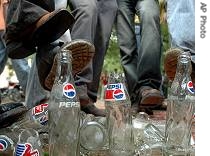2006年VOA标准英语-India's Cola Companies Face Bans Over Alleged P(在线收听)
By Anjana Pasricha
New Delhi
13 August 2006
 Students stamp on Pepsi bottles during a protest demanding the ban on sale of soft drinks in school and college cafeterias during a protest in Ahmadabad, India |
||
-------
The controversy erupted last week when a New Delhi-based environmental watchdog said soft drinks produced by the cola giants contain pesticide residues 24 times higher than those set by the Bureau of Indian Standards.
Coca-Cola and Pepsi have rejected the study by the Center for Science and Environment, saying their soft drinks are "the safest beverages you can drink today."
They say their Indian products meet international standards.
This is the second time the controversy has erupted. A study in 2003 by the same environmental group also claimed to have found high levels of pesticides in the drinks produced by the cola companies.
But this time the cola giants are facing more heat.
The communist government in a southern Indian state, Kerala, has imposed a total ban on production and sales of the soft drinks. Five other states have announced partial bans on the sale of the soft drinks in schools, hospitals and government offices.
The Indian Supreme Court has demanded that the companies reveal their recipe, so that allegations of high pesticide levels can be verified with further tests.
But consumer groups say the campaign against the soft drinks ignores the bigger picture. They say many Indian foods and beverages have high levels of pesticides because intensive use of chemicals by farmers has contaminated the groundwater. They are asking the government to focus on the wider issue of pesticide proliferation.
The head of the Mumbai-based Consumer Guidance Society of India, A.R. Shenoy, is calling for stricter implementation of safety standards in all food products, not only soft drinks.
"We have a lot of problems in other foods also, but who cares, who bothers? We have larger problems of water getting contaminated with microbes, and these are the microbes that will put you off [make you sick] because of diarrhea," he said. "Basically in the system as such there is no regulatory mechanism."
The cola companies are also trying to emphasize the wider issue of pesticide contamination as they mount a public relations campaign to calm consumers.
They have published prominent newspaper advertisements saying pesticide levels in their products are well below levels detected in other foodstuffs such as tea, eggs, grains, fruits and dairy products.
Controversy is not new to cola products, seen by some Indian nationalist groups as symbols of Western cultural imperialism. Coca-Cola pulled out of India in 1977 after the government insisted it reveal its formula, but returned 16 years later.
Coca-Cola and Pepsi control nearly all of India's soft drinks market. The 2003 study saying the drinks contained high levels of pesticides briefly dented sales, but the issue quickly faded from public memory.